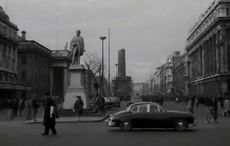|
Prominent leaders of the civil rights era were quick to take him, very deservedly, to the woodshed for that bit of insulting nonsense.
When so many African Americans were already being denied the right to vote in the first place what does the governor imagine would have happened? Does he really think the majority white community would have suddenly come to their senses and seen the error of their ways?
Christie had reluctantly brought up the whole question of civil rights in the 1960s to explain why he wanted the public to vote on whether to grant marriage equality to gay couples in New Jersey now.
“It was our political institutions that were holding things back,” Christie told Philly.com, in an eye-poppingly revisionist moment.
------------------
Read more:
More US politics news from IrishCentral
GOP Senator Charles Grassley puts a hold on E3 immigration bill for the Irish
San Antonio St. Patrick’s Day Parade cancelled after 44 years - VIDEO
------------------
“I don't think there's anything necessarily so special about this particular issue (marriage equality for gays) that it must be handled by a legislature. Why would that be? I don’t understand how anybody could argue with letting the people decide this issue.
“Let’s stop hiding behind this ‘we don't put civil rights on the ballot’ thing. Ya know, please. These folks would put anything on the ballot if they thought they could win.”
But “these folks” would do no such thing. Equal rights for minorities should not be put up to a popular vote. That’s why they are called equal rights, after all.
Protecting the rights of minorities is not a popularity contest. It is a constitutional guarantee.
It seems extraordinary to have to inform a sitting governor of this fact, especially one who holds political science and law degrees, but there you have it.
After being scolded and scoffed at in the press for days for his bizarre analogy, Christie eventually became belligerent and blasted his critics for daring to counter his opinion. But one of the most famous leaders of the civil rights era, Representative John Lewis, was having none of it.
“People of color in the American South could not register to vote simply because of the color of their skin,” Lewis told NewJersey.com. “They could not take a seat at lunch counters in restaurants. Could not take a seat in the front of the bus. Could not visit state capitals. If it had been put to a referendum, we would have never, ever won.”
It’s refreshing to hear the truth in a political climate that prefers fiction. Behind all of Christie’s political posturing, his growing discomfort with the issue was becoming clearer.
------------------
Read more:
More US politics news from IrishCentral
GOP Senator Charles Grassley puts a hold on E3 immigration bill for the Irish
San Antonio St. Patrick’s Day Parade cancelled after 44 years - VIDEO
------------------
And that undercurrent of anger was most in evidence when he heard himself compared to the segregationists of the South.
So in a rearguard action to silence his critics, or perhaps his own conscience, Christie later announced he had nominated the openly gay New Jersey legislator Bruce Harris to the state Supreme Court. No sooner than he was nominated, Harris announced he would recuse himself from all future cases dealing with same-sex marriage because he has advocated for marriage equality.
But U.S. Supreme Court Justice Anthony Scalia, who has publicly advocated against marriage equality for gays, would never recuse himself from a future high court case about marriage equality, so why should Harris?
Would any heterosexual judge recuse themselves over heterosexual marriage or divorce cases, or adoption questions, or any other questions involving heterosexual rights? Certainly not.
The double standard has led some critics to suspect a quid pro quo agreement took place, with Christie offering Harris the job on the understanding he will not challenge Christie’s veto of gay marriage.
It’s important to point out that there is no tradition of judges recusing themselves from cases in the U.S. because, as citizens, they are known to have taken a public stand on some issue. None whatsoever.
So Harris’s move is just ridiculous. It’s also deeply concerning.
We expect a judge to show impartiality, but Harris now confirms that he cannot set aside his personal beliefs, even in a court of law.
By making this move for short-term political gains, Christie is setting long-term political precedents that will almost certainly damage national jurisprudence.
But I don’t think he’s the sort of man who cares about posterity, since it’s never done him any favors.
If I lived in New Jersey though, I’d be concerned about what life will look like after he’s gone.




Comments